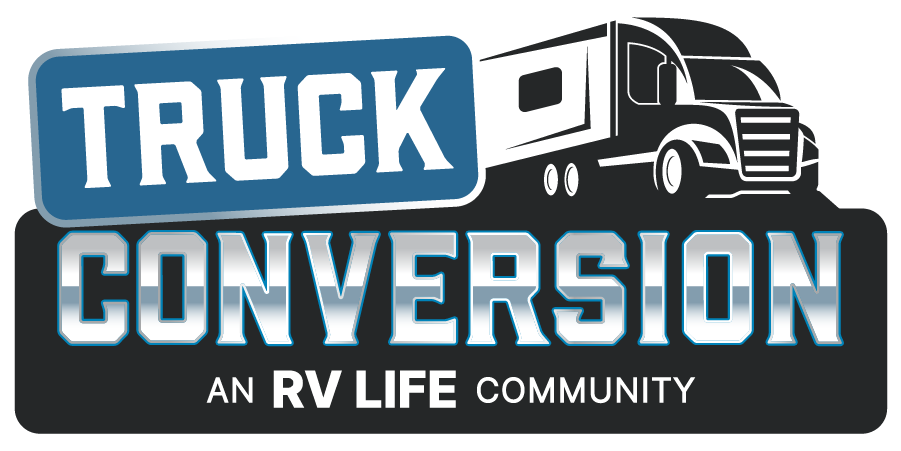Hi everyone.
We are finishing up our truck conversion/camper build and may want to switch out trucks to something with a bit more capacity.
We started with a 2006 Isuzu NRR with a 190hp 4cyl 5.2L diesel, 176" wheelbase, 20 foot flatbed and GVWR of 19,500. The empty weight with the flatbed is 8700 pounds and the cab + chassis is about 6600 pounds.
The goal was to build a modular camper and separate garage pod unit that both would sit on the flatbed. We have finished the camper except for a little cabinet work on the inside and we have mostly completed the garage unit.
Things got a bit heavy. The camper is around 4000 pounds and I estimate the garage unit will be 1800 pounds. We also added about 500 pounds of aluminum storage boxes under the steel flatbed. With the camper and garage pod mounted on the flatbed, we will be pushing 16,000 to 16,500 pounds, allowing only 3000 to 3500 pounds for gear, food, water, passengers, motorcycles. Add to this that the 190hp 4 cylinder is a tad underpowered
We have put too much work into the camper and garage to change them, so if we want more capacity, the change has to come from the truck. I was pretty sold on the cab forward design but recent searches for something bigger have yielded meager results. The GMC T7500 with a 186 inch wheelbase and 20 foot flatbed would seem to be the best fit but they are quite a bit heavier (maybe 11,000 pounds vs the 6,600 pounds of the Isuzu NRR). I am also now considering a conventional cab like a Freightliner or International 4300 (maybe the low profile series?). We are right at 12 feet tall on the Isuzu with it's fairly low deck on 19.5" wheels.
If I could gain a bigger engine and 2000 pounds more of capacity (giving me about 5000 pounds for gear and supplies) but stay under 26,000 GVWR I would be happy. I have not yet found a lot of information on Freightliner or International trucks, like cab/chassis curb weight to see if they would give me this capacity. I am very open to suggestions.
Here are a few pictures of what we have so far:



We are finishing up our truck conversion/camper build and may want to switch out trucks to something with a bit more capacity.
We started with a 2006 Isuzu NRR with a 190hp 4cyl 5.2L diesel, 176" wheelbase, 20 foot flatbed and GVWR of 19,500. The empty weight with the flatbed is 8700 pounds and the cab + chassis is about 6600 pounds.
The goal was to build a modular camper and separate garage pod unit that both would sit on the flatbed. We have finished the camper except for a little cabinet work on the inside and we have mostly completed the garage unit.
Things got a bit heavy. The camper is around 4000 pounds and I estimate the garage unit will be 1800 pounds. We also added about 500 pounds of aluminum storage boxes under the steel flatbed. With the camper and garage pod mounted on the flatbed, we will be pushing 16,000 to 16,500 pounds, allowing only 3000 to 3500 pounds for gear, food, water, passengers, motorcycles. Add to this that the 190hp 4 cylinder is a tad underpowered
We have put too much work into the camper and garage to change them, so if we want more capacity, the change has to come from the truck. I was pretty sold on the cab forward design but recent searches for something bigger have yielded meager results. The GMC T7500 with a 186 inch wheelbase and 20 foot flatbed would seem to be the best fit but they are quite a bit heavier (maybe 11,000 pounds vs the 6,600 pounds of the Isuzu NRR). I am also now considering a conventional cab like a Freightliner or International 4300 (maybe the low profile series?). We are right at 12 feet tall on the Isuzu with it's fairly low deck on 19.5" wheels.
If I could gain a bigger engine and 2000 pounds more of capacity (giving me about 5000 pounds for gear and supplies) but stay under 26,000 GVWR I would be happy. I have not yet found a lot of information on Freightliner or International trucks, like cab/chassis curb weight to see if they would give me this capacity. I am very open to suggestions.
Here are a few pictures of what we have so far:




